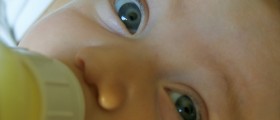
Food poisoning occurs when toxins which are produced by bacteria are taken together with the food. Namely, the food is contaminated not only by bacteria, but also by their toxins and once these toxins enter human gastrointestinal tract food poisoning develops. After consuming contaminated food the body in majority of cases reacts promptly. Still, in some cases weeks may pass by until the first symptoms develop. The severity of food poisoning varies a lot. Some people face mild symptoms and usually stay in bed for a day or two while others require hospitalization and even need to be administered intravenous fluids. Children are more susceptible to food poisoning comparing to adults simply because their immune system is not fully developed. So even after eating small portions of contaminated food children may develop serious symptoms and signs of poisoning.
Causes of Food Poisoning in Children
There are several bacteria that commonly cause food poisoning in both, adults and children. They include Salmonella, Listeria, Campylobacter and Escherichia coli. These bacteria usually contaminate food that has not been stored or prepared properly. The main problem with children is that they generally do not check expiration dates on food products and may not wash fruit. This way they expose themselves to higher risk of getting food poisoning.
Symptoms of Food Poisoning in Children
It may be challenging to diagnose food poisoning in children. This can be easily explained by the fact that the symptoms and signs of food poisoning are rather generic and common to many illnesses of the gastrointestinal tract. They include nausea, vomiting, diarrhea, fever, bloating and cramping. What may help a doctor to set the definitive diagnosis is if a few more people from the family of child's surrounding at school suffer from the same symptoms. This for sure points to food poisoning.
Diagnosis and Treatment for Food Poisoning in Children
The doctor (pediatrician) performs physical examination and asks question among which there are certain ones related to food consumption. Urine, stool and blood samples are taken and conformation of the disease is possible only after these samples are properly examined.
In majority of cases the only treatment is bed rest and if possible intake of plenty of fluids to prevent possible dehydration caused by excessive vomiting or diarrhea. Only in case of severe dehydration children are hospitalized and administered intravenous fluids. In some food poisonings children may be prescribed certain medications. There are no consequences of food poisoning in general and people only have to deal with several unpleasant symptoms and after a few days they can get back on their feet and continue with their lives.









_f_280x120.jpg)







Your thoughts on this
Loading...